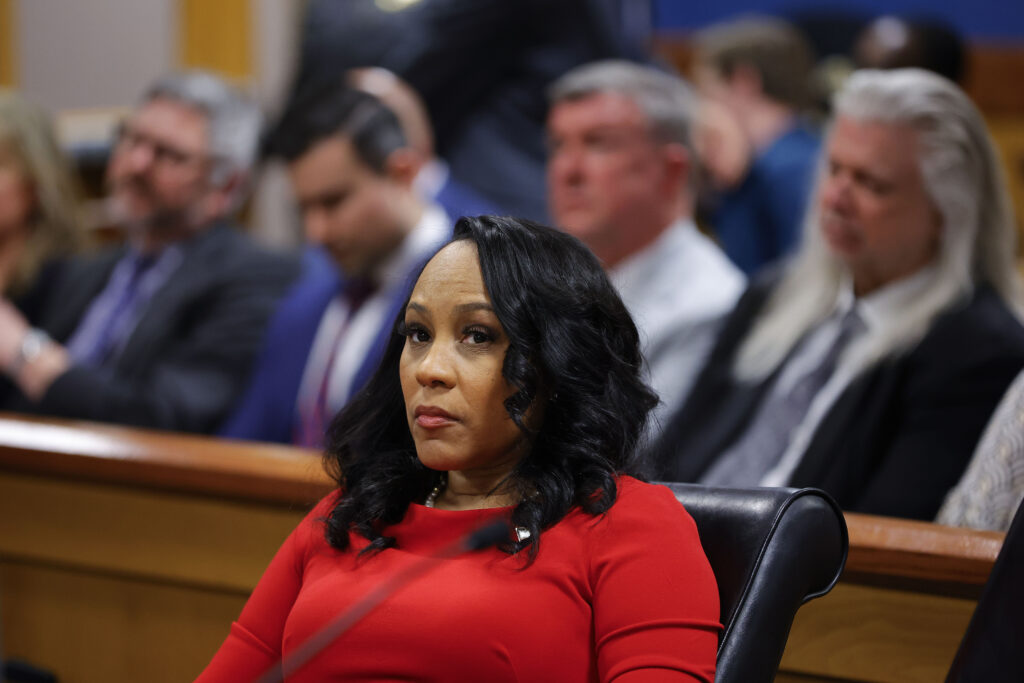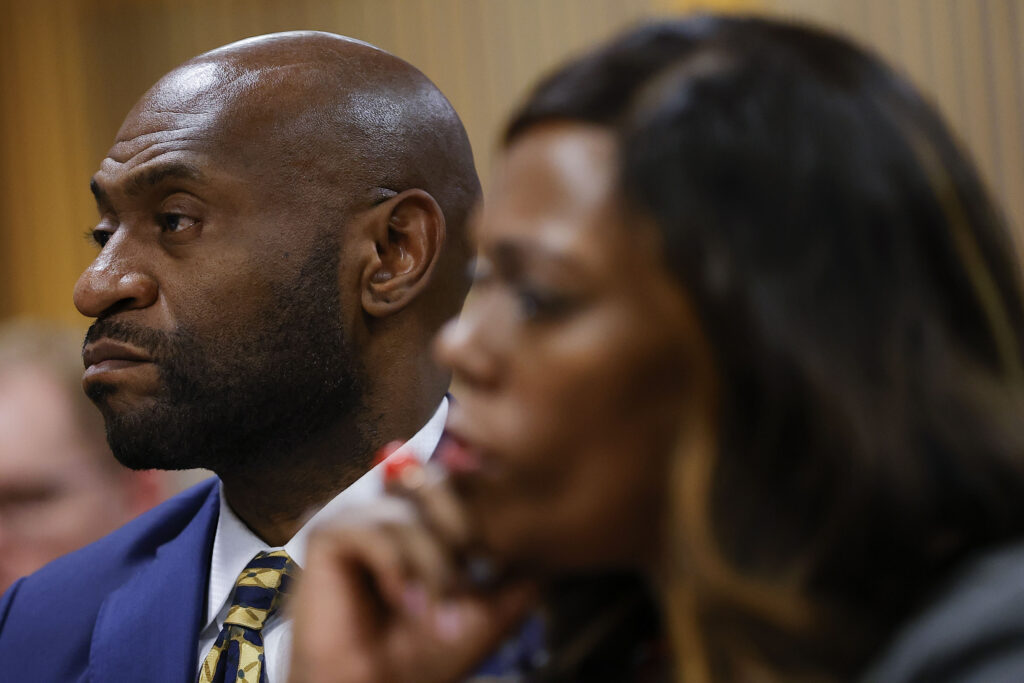Defense attorneys in former President Donald Trump‘s Georgia racketeering case on Friday sought to convince a judge that District Attorney Fani Willis should be disqualified based on an “appearance of a conflict of interest” as closing arguments commenced in the blockbuster case.
Lawyers for the Fulton County DA office and defense attorneys clashed over whether, in order to get Willis removed from the case, the defense needed to present concrete evidence that a conflict of interest occurred — or whether simply the appearance of one is enough.
“I want to make clear to the court that — the law in Georgia suggests and is very clear that we can demonstrate an appearance of a conflict of interest and that is sufficient,” John Merchant, a defense attorney for Mike Roman, told Superior Court Judge Scott McAfee. Shortly after the defense concluded 90 minutes of arguments, Willis stepped into the courtroom to witness her office’s attorneys deliver closing arguments.

Merchant and other defense lawyers, including Trump attorney Steve Sadow, say Willis should be disqualified from the case over allegations of a conflict of interest and self-dealing stemming from her romantic relationship with her hired top prosecutor, Nathan Wade. Both Willis and Wade, the latter whom she hired in late 2021, deny wrongdoing.
Merchant argued that defense attorneys had demonstrated Willis’s “personal interest” in the Trump prosecution.
“You asked what is a personal interest. And I think, frankly, as I was trying to figure this out, I think you know when you see it,” Merchant told the judge. “I think you know when you see it. I think there is good enough facts in front of you that you know when you see it. I think that governing principle helps enlighten some of the facts here.”
The defense demonstrated that Willis received trips paid for by Wade after hiring him for the Fulton County case. Willis said she paid back Wade in cash for the trips, and although she provided no paper trail to prove that claim, Willis said her father taught her to keep cash on hand at her home.
Merchant argued that there is roughly $9,200 of Wade’s trip spending that is unaccounted for. The attorney and the judge discussed whether the amount of money mattered for the disqualification question, to which Merchant argued, “It’s not necessarily the amount of the money. It’s the fact that she received it.”
Merchant added that the defense had presented facts that fit into two categories of disqualification: conflict of interest and forensic misconduct. Forensic misconduct includes false testimony.
A major point of contention was the defense’s assertion that Wade and Willis lied about the origins of their relationship. McAfee suggested that if it turns out to be true that the prosecutors lied under oath about when their relationship began, then a possible remedy might be professional disciplinary action at the state bar.
“The proposition you are putting forward now is that if a representative of the state, the lead prosecutor, the district attorney themselves, says something that is untruthful in the record, that is something that immediately has to be proactively policed by the trial court?” McAfee said. “Basically what I’m getting at is, where in the law do we find the remedy to an untruthful statement? Generally we send you down the street to the bar.”
Sadow argued to McAfee that prosecutors should be held “to a higher standard” and that a finding of any dishonestly should be grounds for Willis’s dismissal from the case.
As for the forensic misconduct claim, Sadow and an attorney for co-defendant David Schafer, Craig Dillen, said that Willis’s recent speech at a church amounted to a “deflection” strategy.
During her January remarks at the church, Willis repeatedly referred to herself as “flawed” and “imperfect” but did not directly acknowledge her relationship with Wade. She implied the allegations of misconduct involving her and Wade were related to their race.
“She chose to play the race card and the God card … to deflect away from the allegations” in the motion for disqualification, Gillen said. “She chose to inject race into the minds of the listeners.”
The court took a short break in the afternoon before attorneys for Willis’s office made their closing arguments. Willis entered the room and sat next to Wade.

Prosecutor Adam Abbate said the defendants made several “material representations” that the judge should consider. He argued that the defense must show an “actual conflict” that Willis gained financially from hiring Wade.
McAfee said that Georgia case law, in his understanding, shows that an appearance of impropriety meets the standard for disqualification, to which Abbate said, “That’s not the standard.”
The judge pushed further on Abbate’s rebuttal, saying that “it’s no longer just the theory that money changed hands, no longer speculation or conjecture.”
CLICK HERE TO READ MORE FROM THE WASHINGTON EXAMINER
It is not clear when McAfee will rule on whether to disqualify Willis, Wade, or her entire office from managing the case. Legal experts previously indicated that it could take days for McAfee to come to a decision, but the judge could rule over the matter at his leisure.
Watch the closing arguments live below:
